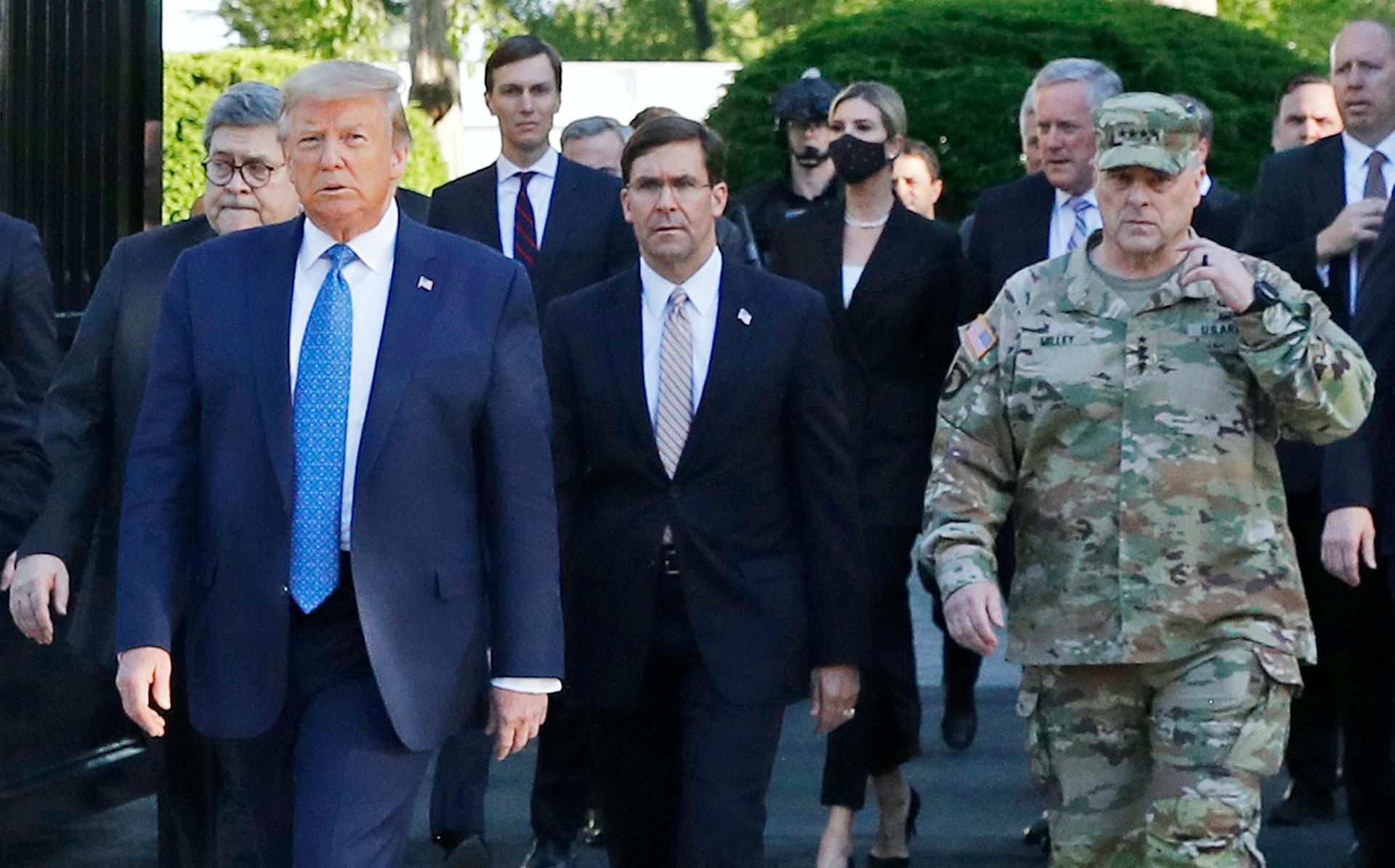Leon Panetta: ‘Put our intelligence people on highest alert’ amid White House outbreak
In this June 1 file photo, President Donald Trump departs the White House to visit outside St. John’s Church. Walking behind Trump, at right, is Gen. Mark Milley, chairman of the Joint Chiefs of Staff.
US President Donald Trump’s top military advisers, including the head of the Joint Chiefs of Staff, General Mark Milley, have gone into quarantine.
They’ve taken this step after the vice-commandant of the US Coast Guard, Admiral Charles Ray, learned that he is infected with the coronavirus.
Related: COVID-19 in the West Wing means instability amid fraught election
Admiral Ray had been at the Pentagon last week for meetings with other military leaders.
For more on the possible consequences, The World host Marco Werman spoke with Leon Panetta, former secretary of defense, director of the CIA and White House chief of staff.
Marco Werman: Secretary Panetta, how significant is this news today?
Leon Panetta: Well, it’s of concern because first and foremost, anytime the president is ill or incapacitated, it raises national security implications. And now to have the chairman of the Joint Chiefs and other military leaders perhaps impacted, that raises concerns about the leadership at the Pentagon at a time of crisis.
Given General Milley’s rank, how will he stay on top of the US military around the globe? Does he have a full classified communications suite in his home?
He certainly has a great deal of communication. More importantly, he does have a deputy who operates under him and usually will run the Joint Chiefs of Staff in his absence. So I’m sure there are individuals who can assume the roles of those that have been impacted. And that gives me some degree of confidence that the business of our defense in this country is going to continue to be protected.
But the fact that it’s happening, the fact that our leadership is being impacted, sends a signal to our adversaries that we are in a vulnerable state.
The very idea that adversaries might try to take advantage of this moment — how much does that worry you?
It worries me a lot. I think that’s when you put our intelligence people on highest alert to make sure that they are watching our adversaries, make sure that they’re looking for any indication that they may try to take advantage of it. This puts the biggest burden, very frankly, on our intelligence-gathering capacity.
Related: COVID-19’s spread in White House shows ‘testing does not replace safety measures’
President Trump, as we know, is unpredictable. There are reports that senior defense officials like Secretary Mark Esper and chairman of the Joint Chiefs of Staff, General Milley, reportedly have come up with their own strategies for working with him. What’s wrong with that picture? And how should these battle-tested generals be dealing with their nominal boss who won’t wear a mask?
It’s a crazy approach — that’s for sure — to have problems with regard to whether or not the president is going to take precautions in dealing with his military and national security leadership. And the people in national security have to worry about whether or not they want to have any direct contact with the president of the United States. I think the most important thing that can happen now is for the president to take care of the COVID-19 that he has. Get well, become not contagious, and recover from what has happened. And in the interim, it’s necessary for the president’s chief of staff and the vice president to be able to make sure that they’re conducting the activities that are important to our national security.
Should we have confidence in our leadership to get this right?
We absolutely have to be prepared to defend this country under any circumstances. And whether the president is incapacitated, whether the leadership of this country is being impacted by COVID-19, it is absolutely essential that the administration take steps to make sure that we have people in backup positions to ensure that we are protected. Look, we have we have the strongest military on the face of the earth.
I’m not worried about our ability to respond to any kind of attack. But what I do worry about is that we become complacent at a time when everybody is concerned about COVID-19, when everybody’s concerned about what is happening to others within a particular command — that we will become complacent and not pay enough attention to the potential threats that are out there.
This interview has been lightly edited and condensed for clarity.
The story you just read is accessible and free to all because thousands of listeners and readers contribute to our nonprofit newsroom. We go deep to bring you the human-centered international reporting that you know you can trust. To do this work and to do it well, we rely on the support of our listeners. If you appreciated our coverage this year, if there was a story that made you pause or a song that moved you, would you consider making a gift to sustain our work through 2024 and beyond?
